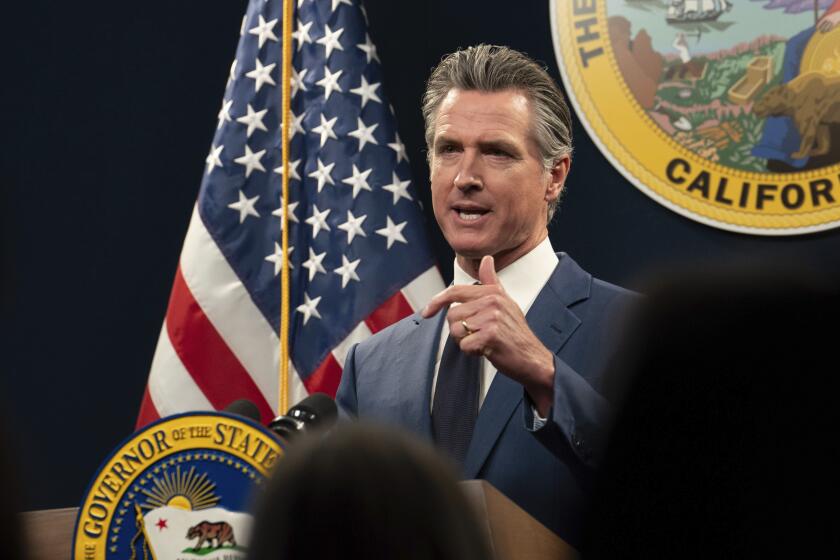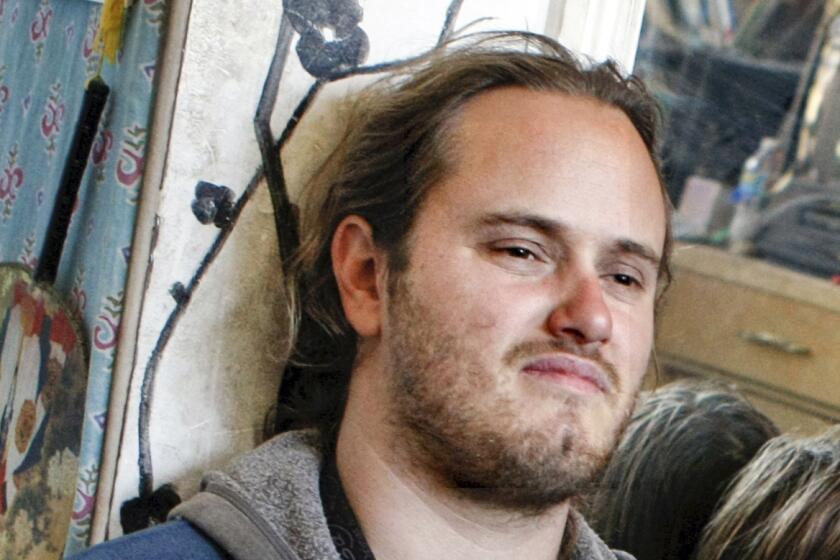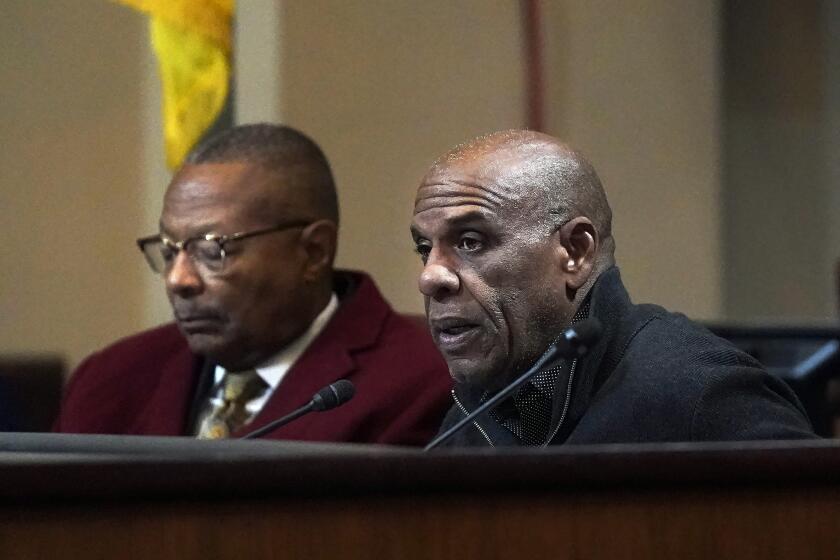O’Neill Keeps His Feet on the Land, but His Heart’s True Love Is Politics
Richard Jerome O’Neill is hoping that the Rev. Jesse Jackson doesn’t get 15% of the 43rd Congressional District vote in the June 7 primary. Not that O’Neill has anything in particular against Jackson. It’s just that if Jackson pulls more than 15%, O’Neill gets knocked out as a Dukakis delegate to the Democratic National Convention in August.
If that seems an odd situation for a man accustomed to picking the delegates--and who seems almost unilaterally to have financed the Democratic Party in Orange County over the past two decades--blame it on the normal chaos that accompanies the Democrats in election years.
Delegates elected at regional party caucuses will be prorated according to popular vote on June 7, and because of some heavy breathing from San Diego, the Mission Viejo area in which O’Neill lives was broken off this election year and attached to San Diego, where O’Neill is neither known nor loved. (“They’re pretty provincial down there,” he says matter-of-factly.) So he came in third in a caucus in which only the first two are assured of the chance to support Michael Dukakis at the convention.
“Hell,” says O’Neill, pondering his fate in his Santa Ana office recently, “if a woman had come in first, I’d be out altogether.”
That’s because the Democrats alternate delegates by sex, regardless of the numerical vote. If the top vote-getter is a woman, then every other delegate is female, even if men pull the next half-dozen highest vote totals. “We are,” says O’Neill mildly, “too democratic sometimes.”
In mid-May, however, O’Neill’s office staff was busy making arrangements for his accommodations in Atlanta. It was clear that O’Neill would be at the convention, one way or another. His offices, like his working life, are divided into two parts. At Rancho Mission Viejo, he wears his ranching hat, holding forth at the headquarters of the company that owns and manages the remaining 40,000 acres of choice south county land that O’Neill and his sister Alice inherited in 1943 but didn’t control, under the terms of the estate, until more than a decade later.
The Santa Ana office is O’Neill’s political base, full of artifacts from almost 30 years of deep involvement in a cause that has been philosophically out of sync with Orange County conservatism since the first freeway snaked south out of Los Angeles.
O’Neill takes all of this in bemused Irish stride. On this day, he is wearing a pink, open-neck shirt with suspenders holding his pants over a generous belly. His gray hair is tousled, and he has kicked off his shoes as he rocks gently behind his desk. His eyes dominate. They are by turn wary, amused, shrewd. They say immediately that they’ve seen a lot and somehow it all makes a tortured--and often funny--kind of sense, even the boy-girl selection of convention delegates. They are not the eyes of a zealot.
O’Neill would rather talk politics than ranching, though he is amenable to either. He is amused by efforts to peg him in the philosophical spectrum. Although he is referred to repeatedly in the press as “moderate to conservative,” he says: “I look at myself as a liberal. But around here, a liberal is looked on as a radical. I think of a liberal in the sense of Jefferson and (Franklin) Roosevelt. Sensible. That’s where I put myself. But I have to keep my mouth shut or be ruined socially in Orange County, so maybe that’s why they think I’m a moderate Democrat.”
He says that Roosevelt and Harry Truman were his early heroes, “but I was young and easily influenced then. In retrospect, Hubert Humphrey was the best I ever met. I really believed that guy.”
O’Neill is also amused by the attitude, prevalent among Southern California’s conservative Republicans, that Democrats are automatically anti-business. He tells about an encounter with state Sen. Ed Davis (R-Valencia)--the former Los Angeles police chief--at a business meeting that O’Neill attended as one of the investors in a Simi Valley development.
“Davis actually said to me, ‘What are you doing here? I didn’t know any Democrats were involved in free enterprise.’ And he was dead serious. I told him I could say the same thing about some truck driver working his tail off in Garden Grove and voting Republican. Or a kid going to college now and voting Republican in spite of the fact that most of the help he’s getting came from Democrats.”
O’Neill also might have pointed out to Davis that he was a successful businessman before he became either a rancher or an active Democrat. Although the land had been in the O’Neill family for five decades before Richard Jerome was born, it was neither easily accessible nor particularly valuable when the young man was growing up. His parents lived in Oceanside and made their livelihood by raising cattle and farming the land at the time Richard was born. But they also had a house in Los Angeles, and that’s where Richard grew up and attended high school. The ranch was a long commute away on the Santa Fe.
He enlisted in the Navy in 1942 and spent two years at sea, mostly as part of a Navy armed guard crew on troop transports. When he was discharged in 1946, he enrolled at Cal Poly in San Luis Obispo. He worked nights as a bartender to pay his way through school, and the sideline intrigued him more than the academics. He got a chance in his third year to buy into a small restaurant, so he quit school and went into business.
“My father died when I was 20,” O’Neill explains, “but the trustees of the estate had control of the ranch until I was 30. So I’d go out there, but I had nothing to do, and the managers were told to pay no attention to me. They ran it. Besides that, I no longer had any real feeling for the place because the headquarters had been moved away from the area I knew when I was growing up.”
So for the next decade, O’Neill used his bartending experience to make a success in the restaurant business, mostly in and around Los Angeles. He was married to his wife, Donna, in 1951, and several years later helped finance three of the early Tiny Naylor restaurants, then became a partner in the chain. It wasn’t until 1954 that he moved his base to Orange County to help operate the family ranch. The trustee still represented his mother’s interest, but Richard and his sister could now prevail against policies that O’Neill told The Times 14 years ago were “conservative to the ridiculous.”
“About 10 years later,” O’Neill recalls, “the developers started coming around, following the freeways out from Los Angeles. They’d even come to my restaurants to talk to me. They were offering $3,000 or $4,000 an acre for land I thought was maybe worth $100. Then after we put in a water district and Leisure World turned out to be a big success, the offers just kept going up.”
That’s when the O’Neills formed the Mission Viejo Co. in alliance with developer Donald Bren. Mission Viejo was wildly successful, but strong personality conflicts developed that caused the O’Neill interests to buy out Bren and then sell the whole package to the Philip Morris Co. in 1976 for a reputed $52 million. That gave the land-rich but cash-poor family sufficient resources to consider options about what to do with the remaining land.
There was some division in the family on this point. His sister Alice’s son, Tony Moiso, a Stanford graduate, became president of the new family company, Rancho Mission Viejo (now also known as the Santa Margarita Co.). Moiso and his mother--according to a series of stories in The Times in the early 1980s--favored further development of the ranch, while Richard was far less enthusiastic, even though, he admitted, “you have a better chance at Vegas on the roulette tables” than continuing to operate the ranch profitably.
So although O’Neill dragged his feet, ambitious plans have gone ahead for the development of large chunks of the remaining 40,000 acres. O’Neill seems resigned to this today, saying: “I don’t like to see the ranch cut up, but I know it’s inevitable. That may not be an issue if Proposition A passes--although, talk about pulling the wool over people’s eyes, this one (Proposition A) is an attempt to shut down the county. Initiatives in general worry me. They’re taking on a life of their own, and they give people false hope of easy solutions. I’d rather see a government that is run through legislation passed by our elected representatives.”
O’Neill can’t talk very long on any issue without relating it somehow to politics. There’s a strong sense that he enjoys the game as much as the result, though clearly nothing would please him more than checking the Republican tide in Orange County. In the midst of the conversation, he broke off to ask, frowning, whether an effort that day to remove Willie Brown as Speaker of the state Assembly had succeeded. He hadn’t heard, and he shook his head, saying, “They’ll kill us at fund raising if that happens.”
O’Neill relates fund raising to both the successes and failures of the Democratic Party in Orange County over the past three decades. The highest point came in 1974, when, for two glorious months, “we out-registered them. They couldn’t organize fast enough to counter us. We put Dick Hanna in Congress and then Jerry Patterson, and we won the county for Alan Cranston and both Browns (Edmund G. (Pat) Brown and Edmund G. Brown Jr.).
“But if we don’t keep after the voters we can’t hold them, because they aren’t committed philosophically to the Democratic Party. It was our wins that organized the Republican Party in Orange County. Before that, they were overconfident, and they put their money into the presidential races because they figured they didn’t need it locally. But (Richard) Nixon’s problems and our wins shook them to the core. Then (Ronald) Reagan came along and brought them back and made possible the highly organized political machine that runs Orange County for the Republicans today.”
He admits that the Democrats helped along their own demise with a series of scandals and a spate of bad judgment calls. The scandals involved Rep. Richard Hanna, who went to prison for taking favors in the so-called Koreagate affair; County Supervisor Robert Battin, who was convicted of using his county staff illegally in a race for lieutenant governor, and Louis Cella, an indefatigable Democratic money raiser, who was sent to prison for income tax fraud. None of this rubbed off on O’Neill, who was involved in business with Cella, and in politics with the others.
The bad judgment calls were mostly over O’Neill’s objections. The most visible involved the appointment of returned Vietnam war prisoner Edison Miller, an outspoken liberal, to the Orange County Board of Supervisors. It was, O’Neill says, “almost as if Jerry Brown were punishing Orange County for being so right-wing.” Another was probably more bad luck than bad judgment: a perception on the part of Orange County voters that Rep. Jerry Patterson was softer on Vietnam and Central America than was Republican Robert K. Dornan, who defeated him.
When O’Neill is talking politics, he comes on rather like Scattergood Baines in the old Saturday Evening Post stories--down-home, corn-pone and folksy. But his eyes tell you that you had better watch your flanks at all times.
O’Neill believes strongly that Orange County will not deliver for George Bush as it did for Ronald Reagan. “I think a lot of people in this county who voted for Reagan in 1984 won’t vote at all in 1988. They’re not involved, not thinking. These candidates are strangers to them. I’m talking about people who only vote for President, people to whom voting isn’t a habit. Orange County is a key area for the Republicans. They’ll raise millions of dollars here, but they won’t get out the vote as they did during the Reagan years.”
As I left O’Neill’s office, a group of local Democrats was filing in for a committee meeting. At 64, O’Neill, who once served as state Democratic chairman, no longer has any official title with the party, but he still goes to meetings and he still listens. Politics is clearly mother’s milk to O’Neill. My last view of him was sitting in a corner of the meeting room, listening to the men around the table. Listening but not participating. Out but still in.
The next day O’Neill called, saying he had been thinking about a parting question in the interview: What were his hopes for the future? He wasn’t sure he had answered it specifically enough. “My goal,” he said, “is to make Orange County into a two-party system. We’re important statewide, and I’d like to bring back some little semblance of political balance here.” Then he paused, chuckled, and said in vintage O’Neill-ese: “When I came in there wasn’t any Democratic Party, and when I leave there may not be one, but in between we’re having a pretty good run.”
More to Read
Get the L.A. Times Politics newsletter
Deeply reported insights into legislation, politics and policy from Sacramento, Washington and beyond. In your inbox three times per week.
You may occasionally receive promotional content from the Los Angeles Times.






